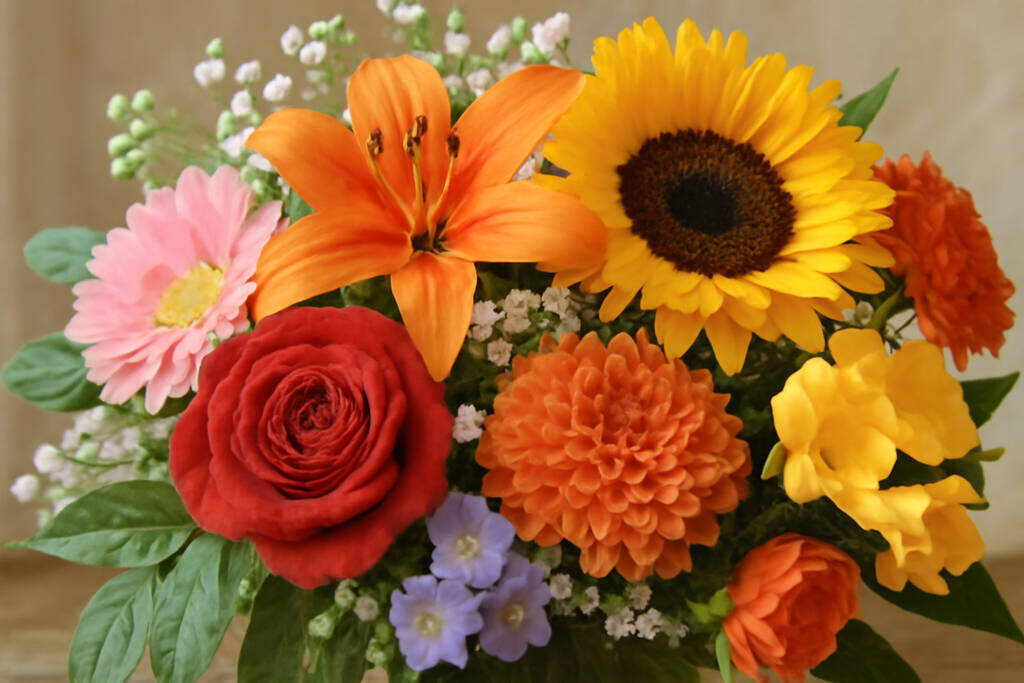Have you ever gotten a bouquet and wondered if the flowers were trying to tell you something? You’re not alone! I once sent a friend a cheerful mix of yellow roses for her birthday, only to learn later that in the old language of flowers, they could sometimes mean jealousy. Whoops! Flowers have a secret, beautiful language all their own, one that’s been spoken for centuries. This guide is your key to understanding that language. Let’s learn how to choose the perfect bloom for every occasion, making your next gift not just beautiful, but deeply meaningful.
1. The Rose: More Than Just Romance
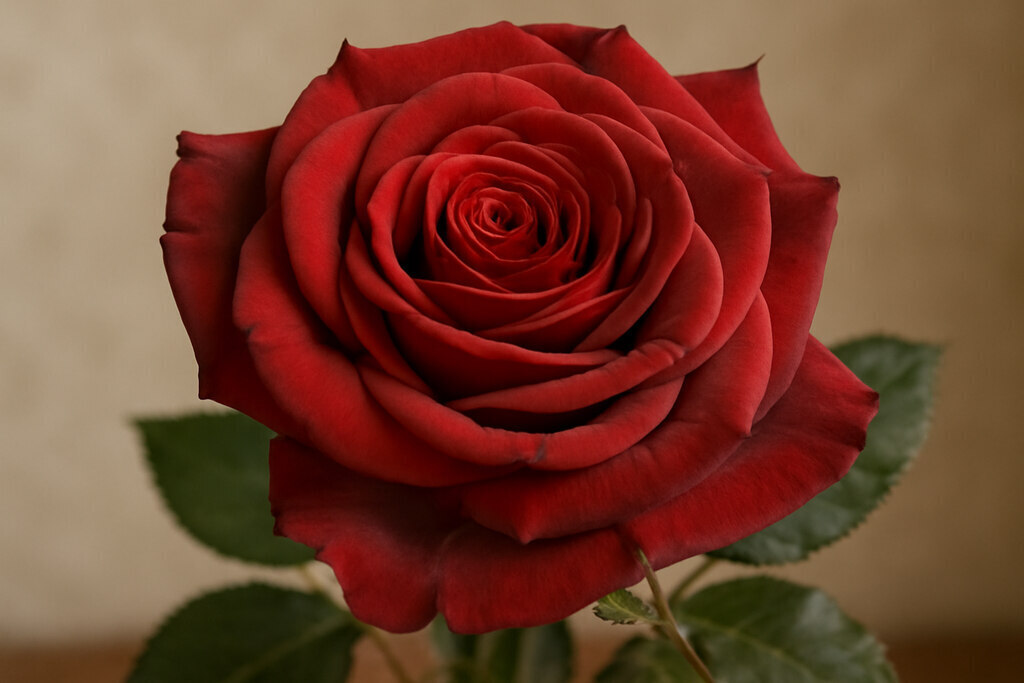
When you think of a rose, you almost certainly think of red roses and grand romantic gestures. And you’re right! A deep red rose traditionally conveys enduring passion and true love. But the rose family has a much wider vocabulary. For instance, the pink rose speaks of gentleness and admiration, making it a perfect choice for a new love or to thank a dear friend. White roses are synonymous with purity, innocence, and new beginnings, which is why they are so popular in weddings and also as a symbol of remembrance.
Then there’s the sunny yellow rose. Once mistakenly associated with jealousy, it has been reclaimed to represent friendship, joy, and warm affection. It’s the “just because” rose, ideal for platting your best friend or celebrating a promotion. Even the number of stems holds meaning. A single rose of any color signifies simplicity and devotion (“you are my one and only”), while a dozen is the classic, full statement of love. So, next time you pick a rose, think beyond red. Choose a color that truly says what’s in your heart.
2. The Lily: A Symbol of Refined Beauty

Lilies are the dramatic, elegant stars of the floral world, often carrying meanings of purity, renewal, and transience. The most common, the white Stargazer or Oriental lily, is powerfully fragrant and is deeply associated with sympathy and the restored innocence of the soul after death. Because of this, they are a frequent and respectful presence at funerals. However, their meaning isn’t limited to sorrow. In fact, as a symbol of motherhood and fertility, the lily is a magnificent gift for a new mother, celebrating the new life she has brought into the world.
The variety of lilies is astounding. The bright, spotted Tiger Lily speaks of wealth, pride, and confidence. The delicate and colorful Peruvian Lily (Alstroemeria), a common bouquet filler, represents friendship and mutual support, making it a long-lasting and cheerful gift for a friend. Calla Lilies, with their stunning, sleek trumpet shape, symbolize magnificent beauty and can also express faith and purity. When gifting lilies, consider the context. Their majestic beauty makes them a stunning centerpiece for any event, from a wedding to a dinner party, where they speak of refined elegance.
3. The Tulip: A Declaration of Perfect Love
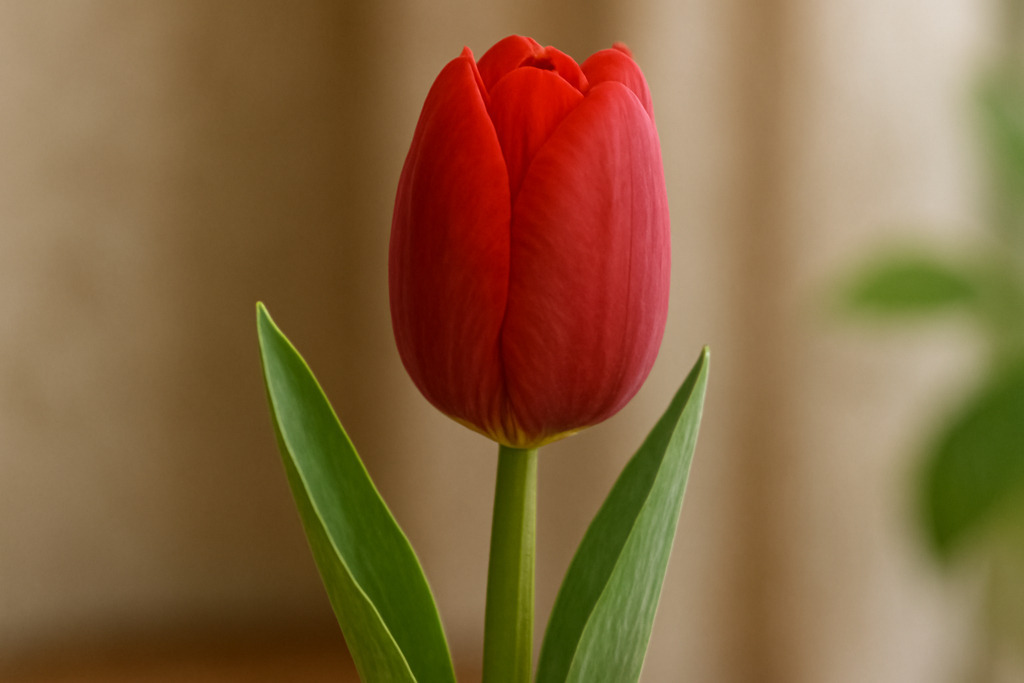
Tulips are one of the most joyful heralds of spring, and their meanings are just as bright and positive. Generally, tulips are associated with perfect, deep love. But like roses, their color tells the full story. The red tulip is the most passionate declaration of love, sometimes considered even more powerful than a rose because it is seen as a more humble and sincere offering. Yellow tulips have undergone a similar transformation to yellow roses; they now represent cheerful thoughts, sunshine, and hope.
Purple tulips are a regal choice, symbolizing royalty and abundance. The creamy white tulip is used to claim worthiness or to send a message of forgiveness. Perhaps the most fun are the vibrant, multi-colored tulips, often called “Rembrandt” tulips, which are a celebration of beautiful eyes. A simple bouquet of tulips on a kitchen table can instantly lift spirits. They are a relatively inexpensive way to bring a massive dose of cheer and color into your home or to give to someone who needs a smile, saying “I’m thinking happy thoughts for you.”
4. The Sunflower: Adoration and Positivity

It’s almost impossible to look at a sunflower and feel sad. These towering blooms, with their bright yellow petals and dark centers, literally turn their faces to follow the sun across the sky—a behavior known as heliotropism. Because of this, they have universally become the symbol of pure adoration, loyalty, longevity, and unwavering positivity. Giving someone sunflowers is like handing them a burst of sunlight; it says, “I adore you,” “You are my sunshine,” or “Stay positive!”
Sunflowers are not subtle or fancy; they are honest, hearty, and happy. They represent the simple, good things in life: warmth, happiness, and spiritual nourishment. They are the perfect gift to wish someone good luck, to congratulate them on a graduation or new venture, or to simply cheer them up on a tough day. A single sunflower in a vase is a powerful statement. In a world that can sometimes be gray, the sunflower reminds us to always seek the light and to stand tall and proud.
5. The Orchid: Exotic Luxury and Strength
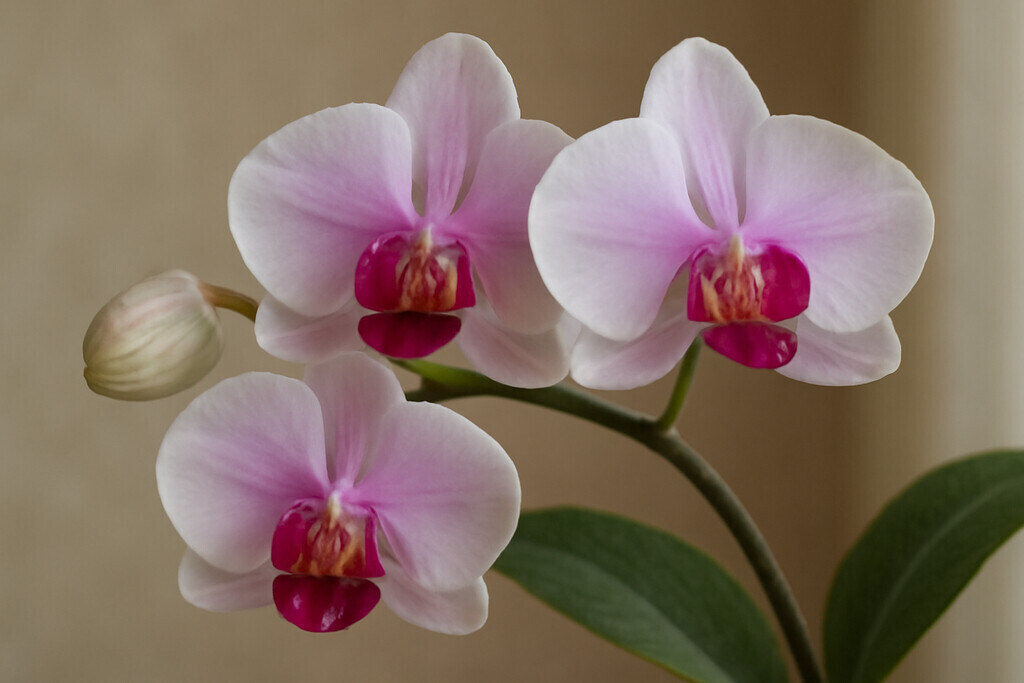
Orchids are exotic, sophisticated, and often intimidatingly beautiful. Their meanings are just as complex and elegant. In general, orchids represent rare and delicate beauty, strength, luxury, and mature charm. In ancient Greece, they were associated with virility and fertility. Giving an orchid is a sign of deep admiration and respect for the recipient’s unique beauty and strength. They are not a casual “get well soon” flower; they are a “I am in awe of you” flower.
The most common, the Phalaenopsis or “Moth Orchid,” symbolizes health and prosperity. The Cattleya orchid, often used in corsages, represents mature charm. Because they are long-lasting and bloom for months, they are also a symbol of endurance and longevity in relationships. An orchid plant is a fantastic gift for a mentor, a respected colleague, or someone with a refined taste. It says, “I see your strength and elegance,” making it one of the most thoughtful and luxurious gifts in the floral language.
6. The Daisy: Innocent Simplicity

Daisies are the epitome of simple, cheerful innocence. With their bright white petals and sunny yellow centers, they seem to smile up at you from the grass. Their name comes from the Old English “dæges ēage,” or “day’s eye,” because their petals open at dawn and close at dusk. This connection to the pure light of day reinforces their meanings of innocence, loyal love, purity, and new beginnings. They are the flower of childhood, of playful love, and of simplicity.
The most classic meaning, drawn from the Victorian era’s game of “he loves me, he loves me not,” is that of a secret love or an oracle of affection. Giving a bouquet of daisies can be a sweet, gentle way to express a budding romance or a pure, platonic affection. Gerbera daisies, with their large, incredibly vibrant heads, specifically convey cheerfulness and are a go-to flower for lifting someone’s spirits. Daisies are unpretentious, happy, and honest. They don’t try to be anything other than what they are: a simple, perfect bit of joy.
7. The Carnation: Fascination and Distinction
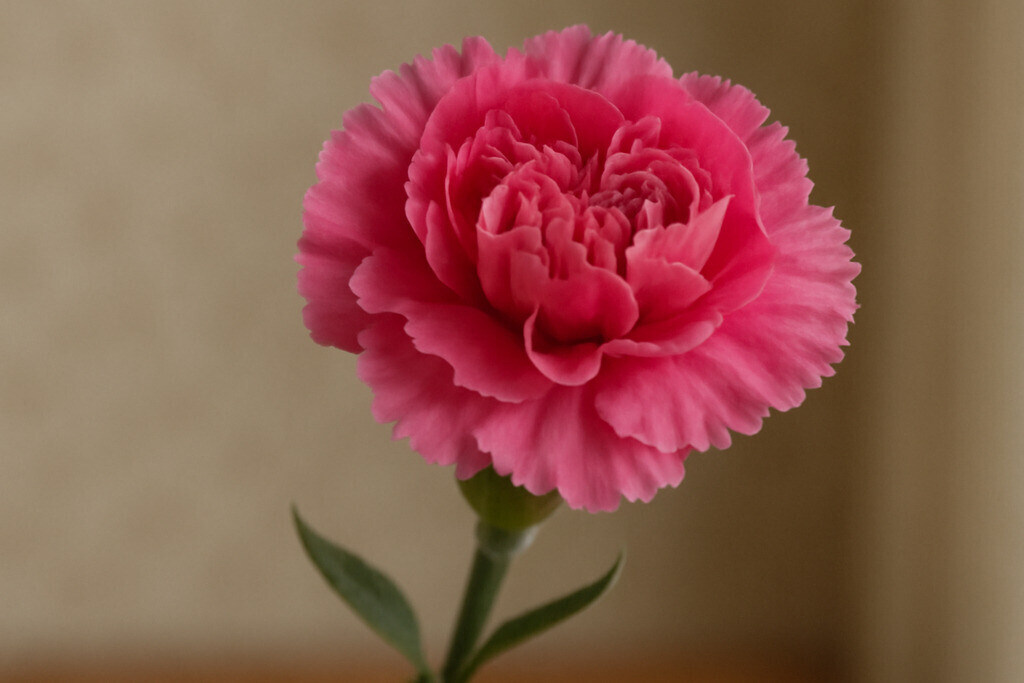
Carnations are incredibly long-lasting and fragrant flowers that often get a bad reputation as being a “filler” flower. But they have a rich history and a nuanced language. The general meaning of carnations is fascination and distinction. Their scientific name, Dianthus, roughly translates to “divine flower.” Like roses, their color tells a very specific story. The deep red carnation symbolizes admiration and affection, while a light red one conveys more personal feelings of love and admiration.
Perhaps the most important distinction is with white carnations, which symbolize pure love and good luck. They are a traditional gift for Mother’s Day, as they were the favorite flower of Anna Jarvis, the founder of the modern holiday. However, a striped carnation is a symbol of refusal or regret—a polite “I can’t be with you.” Pink carnations hold the most legendary meaning; they are said to have first sprung from the Virgin Mary’s tears, making them a symbol of a mother’s undying love. They are a resilient, classic, and deeply meaningful choice.
8. The Peony: Prosperity and Happy Marriage
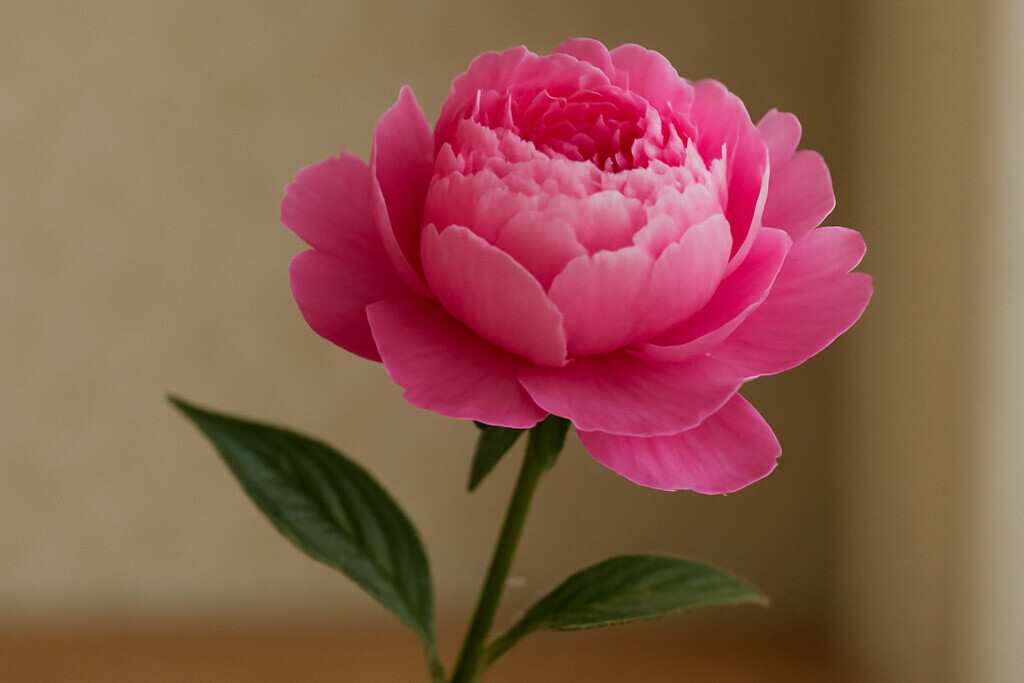
Peonies are the lush, voluminous, and incredibly fragrant darlings of the late spring garden. They are often so heavy with blooms that they require support to stand up! This opulence is central to their meaning: prosperity, good fortune, honor, and a happy marriage or relationship. In many Asian cultures, they are known as the “king of flowers” and are a symbol of wealth, nobility, and peace. Giving someone peonies is like wishing them a life of abundance and joy.
They are a hugely popular wedding flower not just for their beauty and scent, but for their promise of a happy, prosperous, and compassionate marriage. Beyond romance, they can be given to wish someone success in a new business, to celebrate a graduation, or to honor a respected friend. A bouquet of peonies feels like a grand, generous, and celebratory gift. They are the floral equivalent of a heartfelt, joyful toast to someone’s future happiness and success.
9. The Hydrangea: Heartfelt Emotion
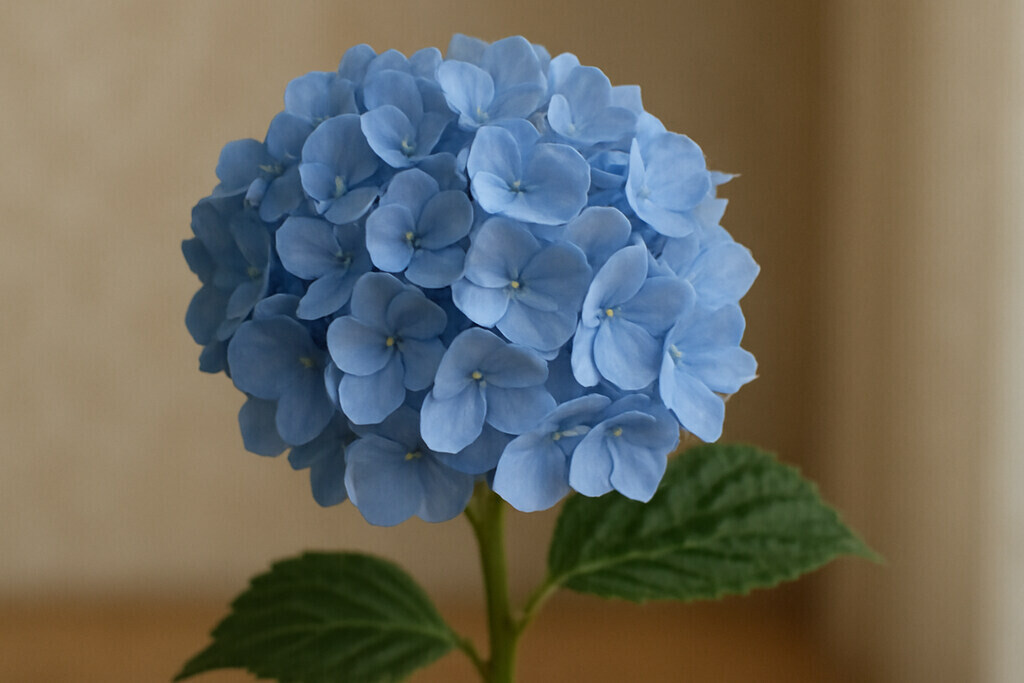
Hydrangeas are unique for their large, showy, ball-shaped clusters of smaller flowers. Their meaning is a bit of a double-edged sword. On one hand, they can represent heartfelt emotion, gratitude for being understood, and boastfulness or vanity due to their extravagant appearance. But this meaning is often tied to their color, which has a fascinating secret: it can change based on the pH of the soil! Blue hydrangeas, grown in acidic soil, are often associated with apology and frigidity.
Pink hydrangeas, from alkaline soil, convey heartfelt emotion and romantic sentiment. White hydrangeas symbolize boasting, bragging, or pure grace. Because of their connection to understanding, they can be a beautiful “thank you” gift for a friend who truly listened and supported you through a hard time. Their voluminous nature makes them a fantastic stand-alone bouquet that says, “I have big, overflowing feelings for you,” whether those are of gratitude, love, or even an apology.
10. The Iris: A Message of Hope and Wisdom

Named after the Greek goddess of the rainbow, the iris is a flower that carries a message of faith, hope, wisdom, courage, and cherished friendship. Its three upright petals are said to symbolize faith, valor, and wisdom. The fleur-de-lis, a stylized iris, has been a symbol of royalty and coats of arms for centuries. In giving an iris, you are expressing a deep trust and admiration for the recipient’s character and wisdom.
The most common color, purple, carries the royal meaning of wisdom and compliments. Blue irises represent hope and faith, while yellow irises convey passion. White irises symbolize purity. They are often given to people embarking on a new journey or facing a challenge, as a symbol of hope and courage. They are also a common sympathy flower, representing the hope of eternal life. An iris is a thoughtful, meaningful gift for a mentor, a brave friend, or anyone you hold in high esteem.
11. The Daffodil (Narcissus): New Beginnings
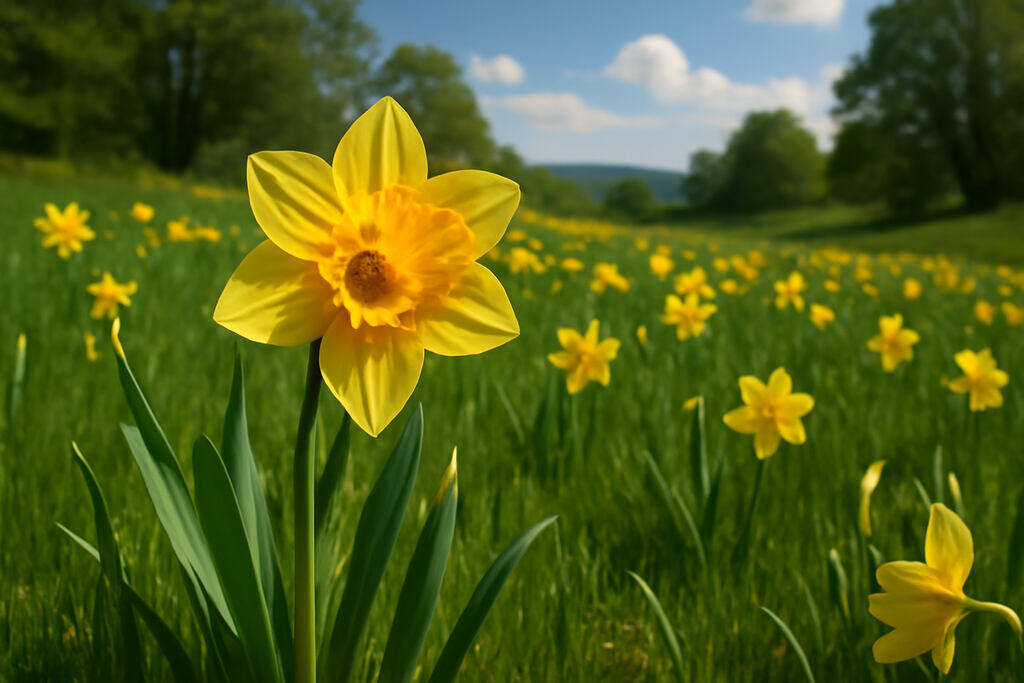
The bright, trumpet-shaped daffodil is one of the very first signs of spring, often pushing through the last of the snow. Because of this, it is the ultimate symbol of new beginnings, rebirth, and the promise of the future. It conveys respect, chivalry, and unrequited love. A gift of daffodils says, “The sun is shining again,” and “I truly care for you and wish you the best in your new chapter.” They are the perfect gift for someone moving house, starting a new job, or recovering from an illness.
A single daffodil is considered a warning of impending misfortune, while a bunch forecasts joy and happiness. It’s important to note that in some cultures, it’s considered bad luck to bring them indoors before the first chicks have hatched! But overwhelmingly, their message is positive. Their association with the Easter season also ties them to ideas of renewal and eternal life. They are a humble, cheerful, and powerfully optimistic flower.
12. The Chrysanthemum (“Mum”): Friendship and Joy
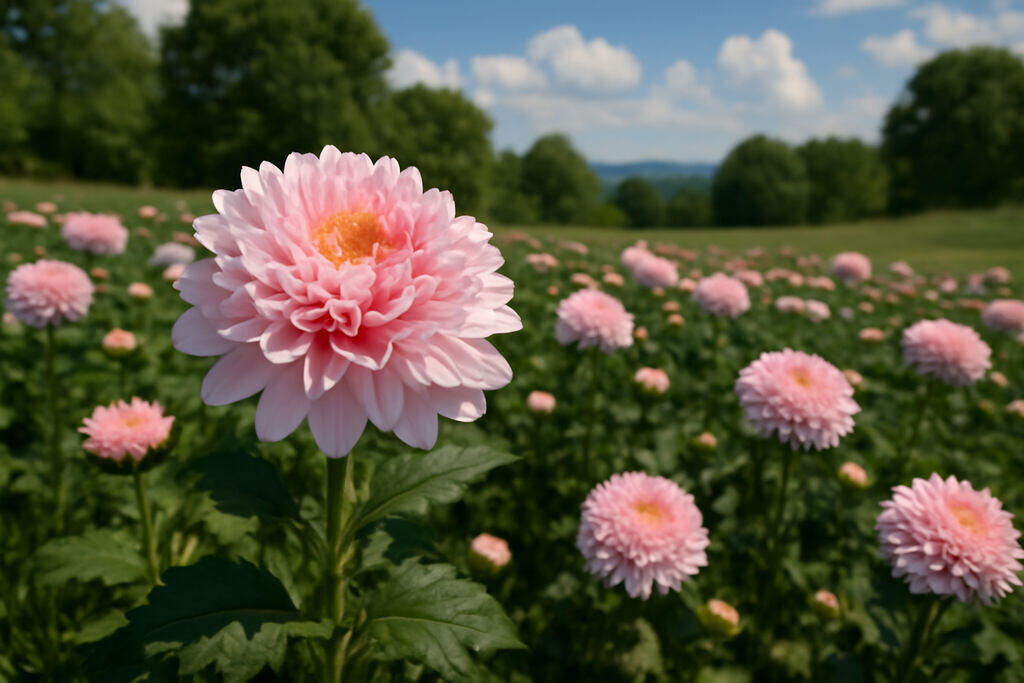
“Mums,” as they are commonly known, are the workhorses of the autumn garden, bursting with color when most other flowers are fading. Their core meaning is one of optimism, joy, and long life. They represent a friendship that is loyal and honest. In many European countries, they are symbolic of death and are used exclusively on graves or for funerals, so it’s important to be aware of this cultural difference.
However, in the United States and elsewhere, they are a celebratory flower. Red mums speak of love and deep passion, white mums symbolize truth and loyal love, and yellow mums represent slighted love or neglected affection. But generally, a mixed bouquet of vibrant mums is a gift of cheer and well-wishing. They are a fantastic, long-lasting gift for a hostess, a friend, or to decorate your own home for fall. They say, “Thank you for your friendship,” and “Let’s enjoy the good times.”
13. The Lavender: Calmness and Devotion

While often thought of as an herb or essential oil, lavender is indeed a beautiful and meaningful purple flower. Its calming, clean scent is the source of its primary meaning: calmness, serenity, and peace. It is also a symbol of devotion, purity, and caution. In the Victorian language of flowers, giving lavender expressed a message of distrust. Today, however, its meaning has softened considerably to represent grace, calm, and the healing of stresses and anxieties.
A gift of dried lavender is a wish for peace and tranquility in someone’s life. It’s a thoughtful present for someone who is overworked, moving into a new home, or needs a moment of quiet reflection. Its association with devotion also makes it a subtle, aromatic token of love and commitment. Whether as a fresh sprig, a dried bundle, or a sachet, lavender conveys a deeply soothing and caring message: “I wish you peace and calm.”
14. The Forget-Me-Not: True Love and Memory
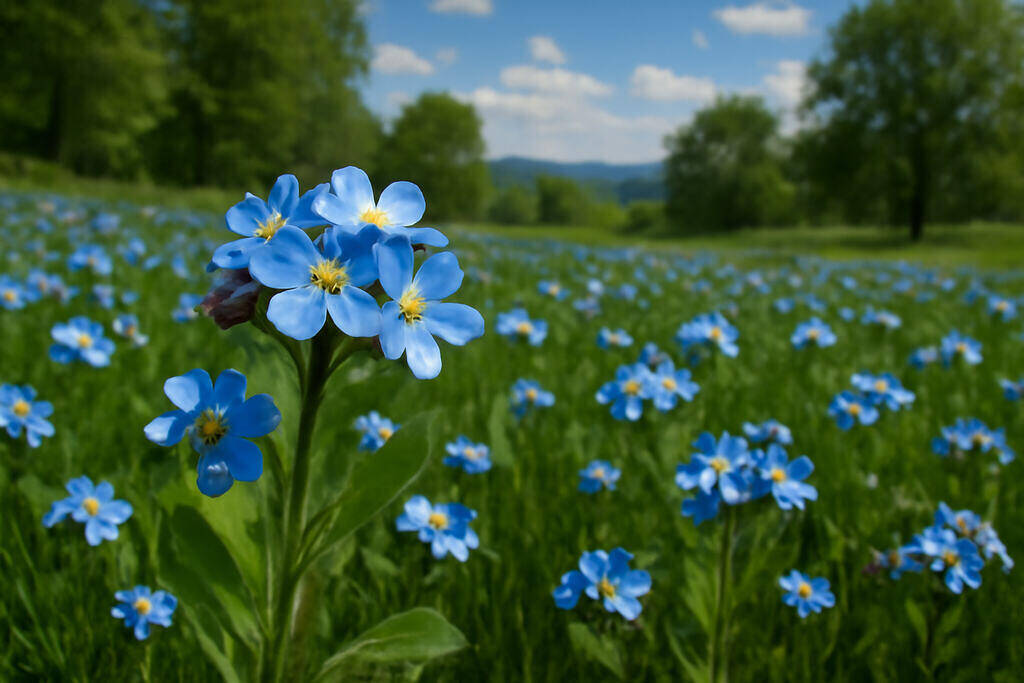
The tiny, delicate, and sky-blue forget-me-not carries one of the most poignant and clear meanings in the floral dictionary: true love, remembrance, and a connection that lasts through time and distance. The name itself is a plea not to be forgotten. According to a German legend, a knight picking these flowers for his lover fell into a river and, before being swept away, threw the bouquet to her, shouting, “Forget me not!” This tragic tale cemented its meaning.
They are not typically given in large bouquets but as a small, tender token. They are the perfect flower to give to a partner before a long separation, to remember a lost loved one, or to honor a deep and enduring friendship that has stood the test of time. They are humble but powerful, saying, “No matter where I am, I will always remember you and hold you in my heart.” Their message is one of unwavering loyalty.
15. The Gardenia: Secret Love and Purity
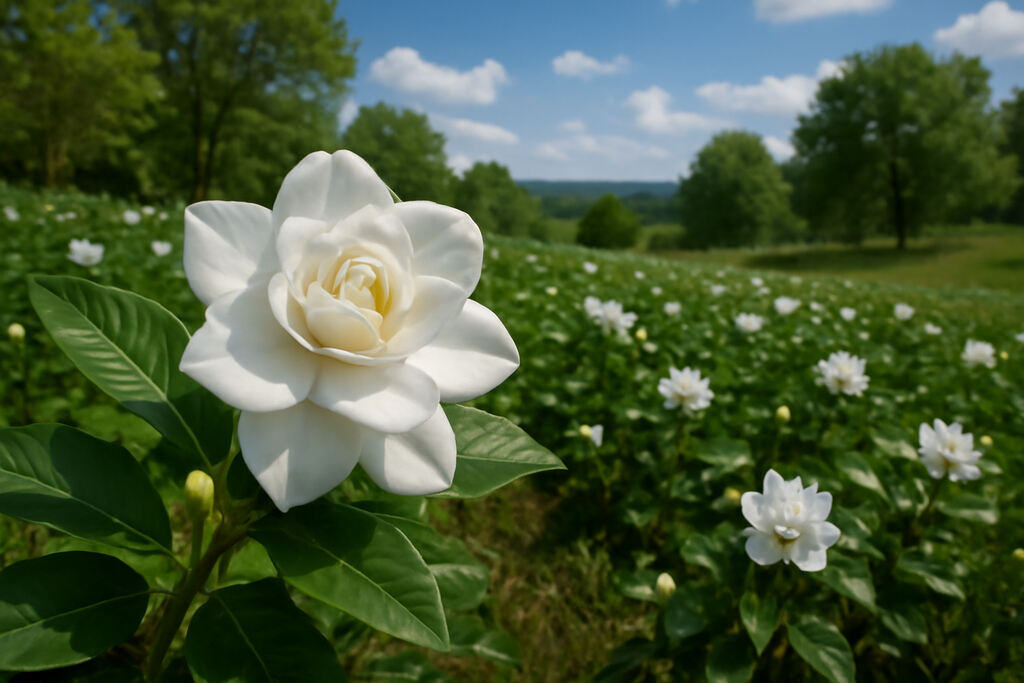
Gardenias are the flower of intense, secret admiration. With their waxy, creamy white petals and an intoxicating, heavy scent, they are the epitome of refinement and secret love. They symbolize purity, sweetness, and a love that is too new or too private to shout from the rooftops. Giving a gardenia is like sharing a beautiful, fragrant secret with someone. It says, “You are lovely,” and “My feelings for you are deep and sincere.”
They are also a symbol of clarity and rejuvenation. However, their primary message is one of unspoken understanding and spiritual attraction. They are a popular choice for wedding bouquets and corsages due to their pure beauty and scent. Because they are delicate and can be difficult to grow, they also convey a message of rarity and preciousness. A single gardenia blossom is a profoundly romantic and sophisticated gesture, perfect for expressing a deep, heartfelt emotion that doesn’t need words.
Conclusion

And there you have it—a beginner’s guide to speaking the beautiful, silent language of flowers. Remember, the most important meaning is the one you it. The best bouquet is always the one chosen with a specific person in mind. So the next time you’re picking out flowers, don’t just grab the first pretty bunch you see. Take a moment. Think about your friend’s personality, your message, and the story you want to tell. Let your flowers do the talking, and watch how a simple, thoughtful gift can create a moment of genuine connection and joy. Now go out and say it with flowers

